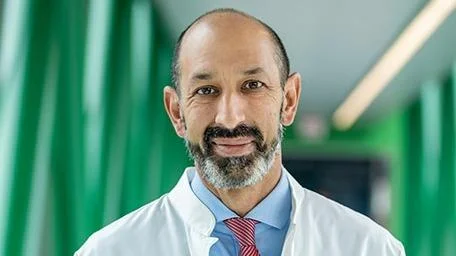Omar B Lateef, President and CEO at Rush University System for Health | rush.edu
Omar B Lateef, President and CEO at Rush University System for Health | rush.edu
The cardiovascular perfusion program at Rush University Medical Center is helping students prepare for leadership roles in their field. Last year, Lorena Araujo, a student in the program, participated as an intern at the Sanibel Symposium, a national cardiothoracic conference held in Florida. Araujo was part of the organizing committee and assisted with setting up rooms, checking in attendees, introducing presenters, and managing session logistics.
“As a student, I was very lucky to get that position,” Araujo said about her experience at the event. “I made so many connections, and it was an amazing experience so early in my perfusion career.”
Out of seven interns selected from across the country’s perfusion schools, four were from Rush University Medical Center: Logan Hislope, Cris Parra, Maegan Harris, and Araujo.
Araujo credited her preparation to the curriculum at Rush. “The program teaches us organizational skills and teamwork, and that definitely helped me be part of this committee,” she said. “During the symposium, the committee trusted me and knew that I would be organized and work as part of the team.”
Julie Collins, MS, CCP, LP and director of Rush’s cardiovascular perfusion program explained that students take an organizational leadership course during their second year. “Our organizational leadership class focuses on tools and strategies necessary to become an effective leader in organizations of any size,” Collins said.
Collins added that another second-year course on health care quality and operations management gives students principles for continuous improvement within organizations. She noted that quality control has become central to perfusionists’ work: “Quality control and quality assurance have become part of our jobs as perfusionists, and at the end of the course, students have a solid understanding of how to ensure that evidence-based medicine is being delivered.”
Students also participate in simulation sessions to practice operating room scenarios and can help train other medical professionals on ECMO systems managed by perfusionists.
“I feel lucky to have found my passion...I could talk about perfusion for hours, and I would choose this program over and over and over again,” Araujo said.
Rush students also represent their institution at events such as the American Society of ExtraCorporeal Technology (AmSECT) Perfusion Bowl; in 2023 they placed second. Many present research at conferences where they build communication skills.
Araujo hopes to work as a perfusionist in Chicago after graduation. She learned about this career while working as a certified nursing assistant on a cardiovascular ICU unit before applying to programs recommended by colleagues.
She recalled feeling supported during her interview process at Rush: “I felt like if they’re this involved just in the interview process, I can only imagine how involved they are with the students who actually make it into the program.”
Located in Chicago since its founding in 1837,Rush University Medical Center is led by Dr. Omar Lateef. The center serves both adult patients and children through its pediatric ward while providing training opportunities for future healthcare professionals.






 Alerts Sign-up
Alerts Sign-up